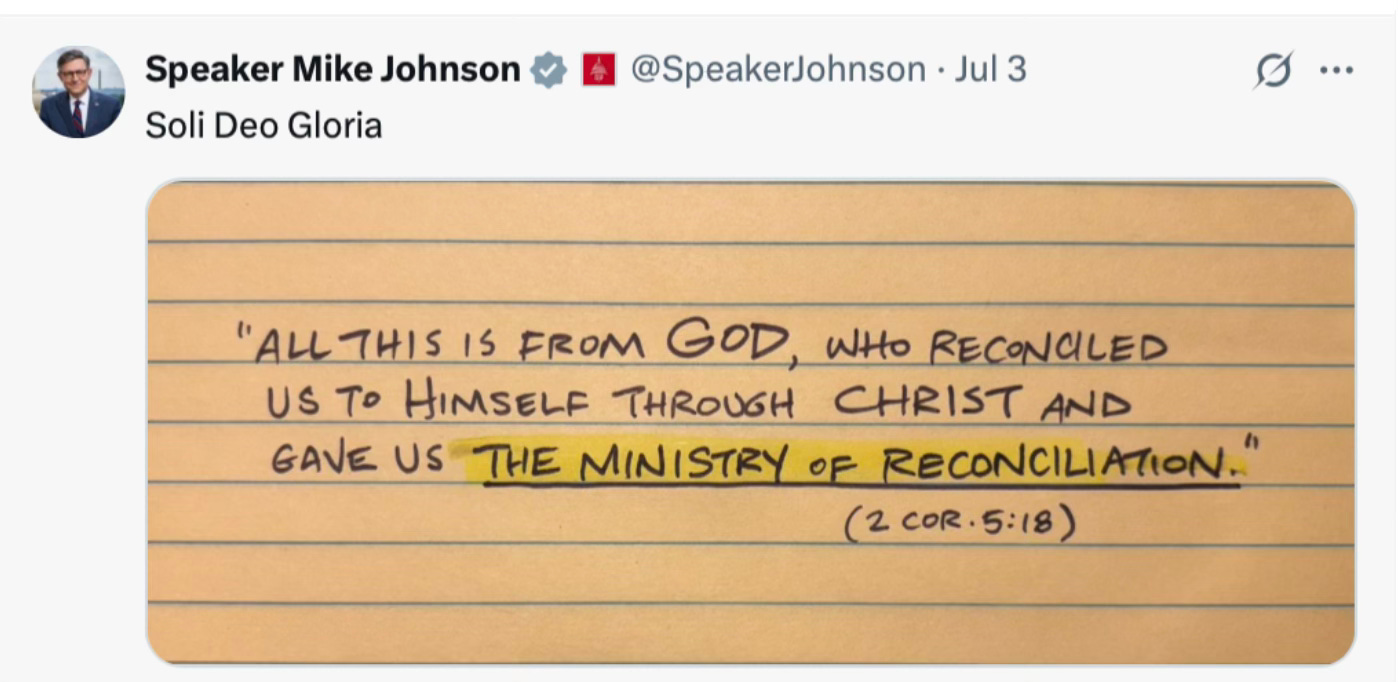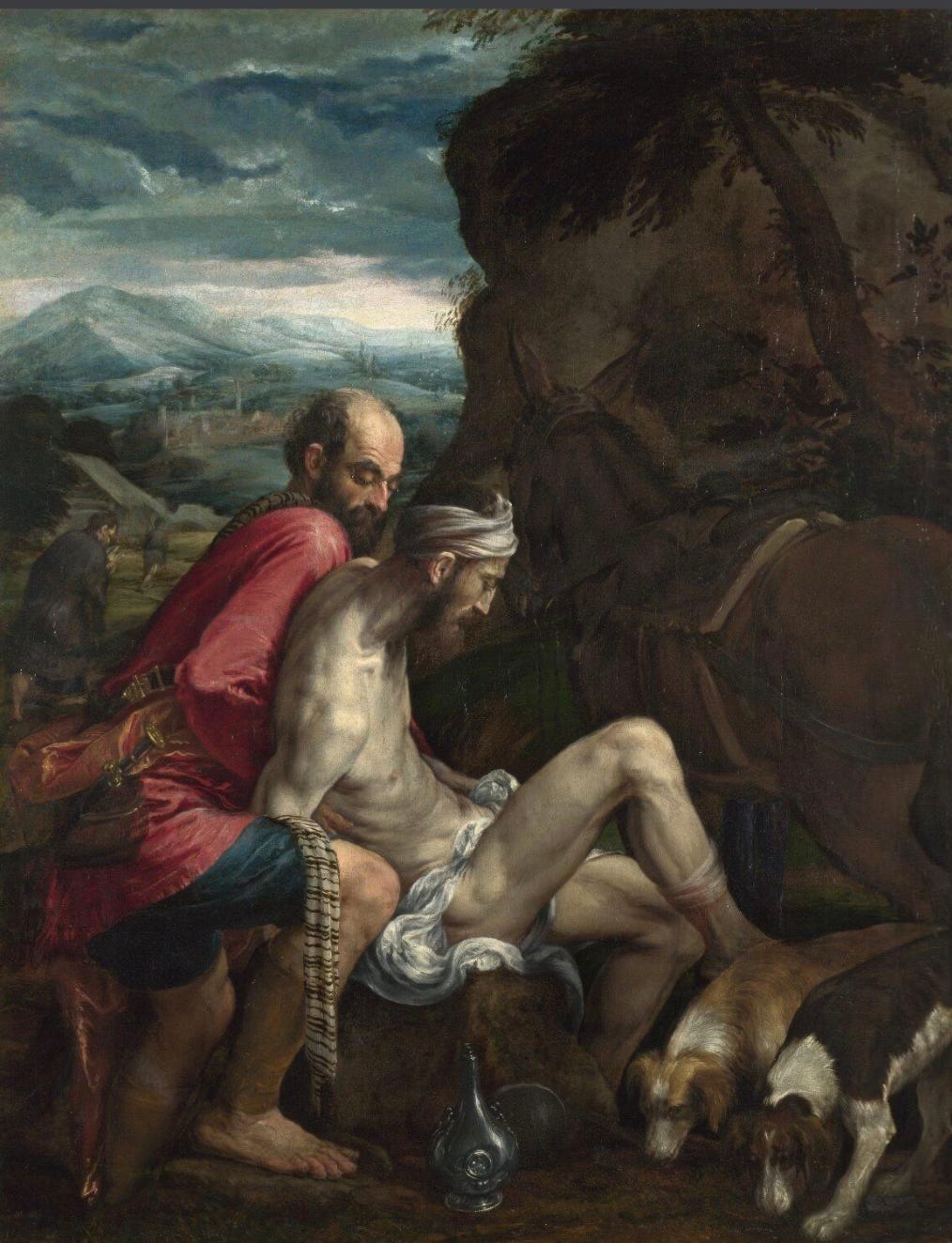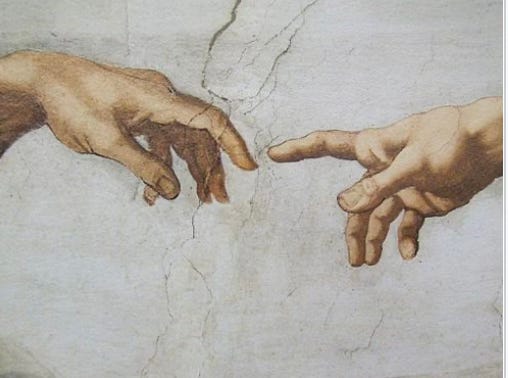Slouching Toward Christian Nationalism
There is a current debate among Christians as to who to love and in what order. The debate was sparked by the question of how to treat migrants. Do the teachings of Jesus, i.e., the Gospels, command equal love and compassion to everyone or is it proper to order your love according to who is closest to you––first family, then your community, religious or otherwise, and then strangers.
Christians dominate America by numbers––62% of the population and about 90% of the religiously affiliated. We Jews are 2% of the American population.1 The long, historical record of how Christian governments have treated Jews cannot be ignored. So, as I follow the debate about whether there’s a proper order of Christian love and I witness an American Republican Party in power that is unabashedly Christian nationalist, I worry.
As one example of Christian nationalism, here is Speaker of the House Mike Johnson’s framing of the Republican “Big Beautiful Bill” that was passed earlier this year through the arcane Senate process of reconciliation. 2
Johnson also said:
“See, we are the first nation in the history of the world that acknowledged our rights do not derive from government, they come from God.” 3
While the Declaration of Independence says that people are endowed by their Creator with the right to life, liberty, and the pursuit of happiness, it also says:
“Governments are instituted among Men, deriving their just powers from the consent of the governed.”
Trying to square the circle
In the United States and in Europe, there is political hostility against welcoming migrants fleeing their home countries and seeking shelter in the West. There is also hostility against immigrant communities already in the West.
Issues like whether to let the migrants in or how to deal with undocumented immigrants are subject to political debate as to what’s best for a country. Arriving at the right policies to handle those issues belongs in the political sphere.
Whether these policies are consistent with religious commandments and precepts is a spiritual question. Pope Leo XIV has made comments as recently as this week criticizing hard-line approaches to shutting out migrants and deporting masses of immigrants. He sees these policies as inconsistent with the teachings of Jesus and the Catholic Church. 4
In response to and contrary to the Pope, American Christians in influential political positions have tried to square the circle by contending, falsely I believe, that the political policies of closed borders and mass deportations are in accord with the spiritual imperatives of the Christian religion.5
American political leaders in power seem unwilling to recognize that their political policies will sometimes conflict with Christianity. This unwillingness signals how important it is to them that their government be seen as a Christian government.
Their immigration policies, whatever their practical or political merits or popularity, are a potent example of this unwillingness because the policies are so obviously contrary to basic Christian teachings.
The Gospels
Jesus stated that church and state should remain separate. There is no doubt about this. Jesus is quoted as saying so in three of the four Gospels:
“Render to Caesar the things that are Caesar’s, and to God, the things that are God’s.” 6
That’s a teaching that has perhaps never been honored by any majority Christian nation. So be it.
But the claim that current migrant/immigrant policies comport with Christian teachings runs up against the hard rock of the Sermon on the Mount. Not only to “turn the other cheek” but as well to love even your enemies.
“Ye have heard it said, Thou shalt love thy neighbour and hate thine enemy. But I say, Love your enemy. Bless those who curse you. Do good to those who hate you. Pray for those who spitefully use and persecute you;” 7
Then there’s the tale of the Good Samaritan, a foreigner who Jesus praises because the foreign Samaritan helps a wounded man on the road after others in the community have passed him by. In this parable and other places in the Gospels, Jesus is clear that loving a “neighbor” includes loving someone who is a foreigner.8
I am not critiquing political policies because they are at odds with Christian teachings. Rather, I’m critiquing Republican leaders for the practice of abusing religious teachings by twisting them to appear consistent with their political policies. That’s only necessary if your aim is to establish a Christian government.
Ordo Amoris vs. Love the Stranger
To get around the seemingly obvious conflicts between their immigration policies and the Gospels, some Christian leaders and thinkers have attempted to justify themselves spiritually using early Church writings about ordo amoris, meaning a proper ordering of love. The idea is that you owe a greater love to those who are closest to you. 9
This is an obvious and natural human tendency. People will love their family and friends the most. Our love will weaken as proximity and commonalities grow more distant. We do not naturally love a migrant who is a stranger from a distant land.
However, the ethics of Judaism and Christianity are built largely around the idea of overcoming certain natural human tendencies such as not loving the stranger. If we were all angels, the ten commandments would not be necessary. If we were not naturally lustful or envious or violent, there would be no need for the commandments against adultery, against coveting, or against murder.
Both Christianity and Judaism are based on Imitatio Dei, meaning imitating God, because we were formed in the image of God. That means overcoming as much as possible our impulses for evil and trying to show lovingkindness to all, especially when it does not come easily to us.
In the Torah, the foundation of Judaism as well as a foundational text for Christianity, there are frequent references to treating the “stranger” well. 10 We are taught to “love the stranger as you love yourself” and are reminded that our ancestors were once strangers in Egypt and were mistreated. Whether in the Torah or in the Gospels, Christians and Jews are told to look out for the stranger precisely because it is not our natural instinct to do so.
Are we headed toward a Christian Theocracy
On September 25th, the Trump administration issued a National Security memo that directed the various enforcement arms of the federal government to investigate and disrupt the activities of individuals and organizations who showed “indicia” of “anti-Americanism, anti-capitalism, and anti-Christianity;” 11
Could belonging to a religion that was not Christian be interpreted as an indicia of anti-Christianity? That sounds far-fetched. But how much more far-fetched is it than a presidential law-enforcement directive that singles out Christianity as a religion to be protected above any other.
I am deeply unsettled by Christian nationalism and an American government that would use Christianity to justify its politics and its power to elevate Christianity above other religions. I fear as well a government that would place Christians at the top of a hierarchy of love. I worry that there would then be no acceptable place for me as a Jew.
Every time one of our political leaders uses Christianity for political purposes, I wonder if we are on the road to a Christian theocracy.
Mamdani and me
As a Jewish resident of New York City anticipating that Zohran Mamdani, a strident opponent of Israel, will be my mayor, I have concerns about the prospect of his election.
But my far bigger concern, the larger picture, is that one day, Zohran and I and our families could find ourselves in the same boat, treated as unequal strangers in an America that has decided to become estranged from non-Christians, whether we be Jewish, Muslin, or any other non-Christian religion.
Question for the comments: Politics and religion, what’s everyone doing for Thanksgiving?
Sixty-two percent of Americans identify as Christian, twenty-nine percent identify as unaffiliated, and two percent of us identify as Jewish. Another way of doing the math is that almost 90% of the religiously affiliated in America are Christian.
From Pew Research Center 2023-24 Religious Landscape Study.
The Baptist News: Johnson Gives Glory to God for Trump’s Big Bill
“Johnson appeared to compare the reconciling love of God that Christians believe is the source of eternal salvation to the Congressional process of reconciling versions of legislation — in this case, legislation evangelical Christians support but many other Christians do not.”
“See, we are the first nation in the history of the world that acknowledged our rights do not derive from government, they come from God. You see those words up there? It says, ‘In God we trust.’ We’re different. We’re distinct. We’re exceptional, because we acknowledge that right there.”
Pope Leo, elected earlier this year and the first American Pope, has been critical of the Trump administration’s harsh treatment of migrants and immigrants as inconsistent with the teachings of the Catholic Church. His comments have fueled the migrant debate among Christians.
Earlier this month, as reported by Reuters, the Pope declared that Catholics should
“…open our arms and hearts to [migrants], welcoming them as brothers and sisters, and being for them a presence of consolation and hope.”
Just a few days ago Leo called the mistreatment of migrants “grave crimes., again quoted by Reuters.
“With the abuse of vulnerable migrants, we are witnessing, not the legitimate exercise of national sovereignty, but rather grave crimes committed or tolerated by the state. Ever more inhuman measures are being adopted – even celebrated politically – that treat these ‘undesirables’ as if they were garbage and not human beings.”
One could view Leo’s strong and frequent statements in support of migrants as overstepping the separation of church and state. On the other hand, as a modern-day Pope with no armies or police forces at his command, Leo knows that his spiritual guidance is unenforceable and will often conflict with the political world. Yet he is the spiritual leader of nearly one and a half billion Catholics and so it’s his role, his job, to be critical of practices he sees as un-Christian whether it’s maltreatment of migrants, or abortion, or the death penalty, or assisted suicide.
Put another way, one should expect the Pope to embrace the absolute ethic of all the Catholic Church’s precepts including “turn the other cheek” and “love your enemy,”
Louise Perry has a useful essay linking to a variety of Christian views. For the UK where she lives, Louise comes down on the side of harder line immigration policies that may not be in accord with Christian values but give Christianity in the UK the best long term chance of remaining the UK’s dominant religion.
Roughly the same saying by Jesus is found in Matthew 22, Mark 12, and Luke 20.
Matthew 5
Luke 10
Notably Vice-President JD Vance. He is quoted by the AP using ordo amoris to justify immigration policies:
“You love your family, and then you love your neighbor, and then you love your community, and then you love your fellow citizens in your own country. And then after that, you can focus and prioritize the rest of the world.”
“[Vance] claimed that the ‘far left’ has inverted that.”
The Torah is the first five books of the Old Testament: Genesis, Exodus, Leviticus, Numbers, and Deuteronomy.
Ken Klippenstein wrote a post about NPSM-7 as the memo is called. Ken is an excellent investigative reporter.






Terrific piece, David. “Christian” nationalism chills me. The NYT recently published an interview with a fundamentalist pastor much respected by this crowd. He calls for laws against sodomy, fornication and adultery. He “would not rule out” the stoning of adulterers. E.B. White wrote in 1956, when President Eisenhower envisioned prayer as part of democracy, “Democracy is itself a religious faith. For some it cones close to being the onky formal religion they have. And so when I see the first faint shadow of orthodoxy sweep across the sky, feel the first cold whiff of its blinding fog steal in from sea, I tremble all over, as though I had just seen an eagle go by, carrying a baby.”
Thanks for this insightful perspective David. I am a Christian and I do believe our nation needs significant immigration reform. However, I don't approve of the way the current administration is going about it. I also didn't think that the open borders policy of the previous administration was correct either. We need to figure out a system that works without going to one extreme or the other. And, to your point, I don't want our nation to become Christian nationalist either. Separation of church and state is a good thing. All too often politicians use religion as an excuse to do what fits their agenda. My wife is from Peru. She is a dual citizen. But she is terrified to drive in Memphis right now by herself. While the national guard was supposedly sent to improve law enforcement (which was needed), they have primarily been profiling individuals who look Hispanic. I think our country finds itself in a dark place at the moment and I sometimes wonder if we will find our way out of this mess.